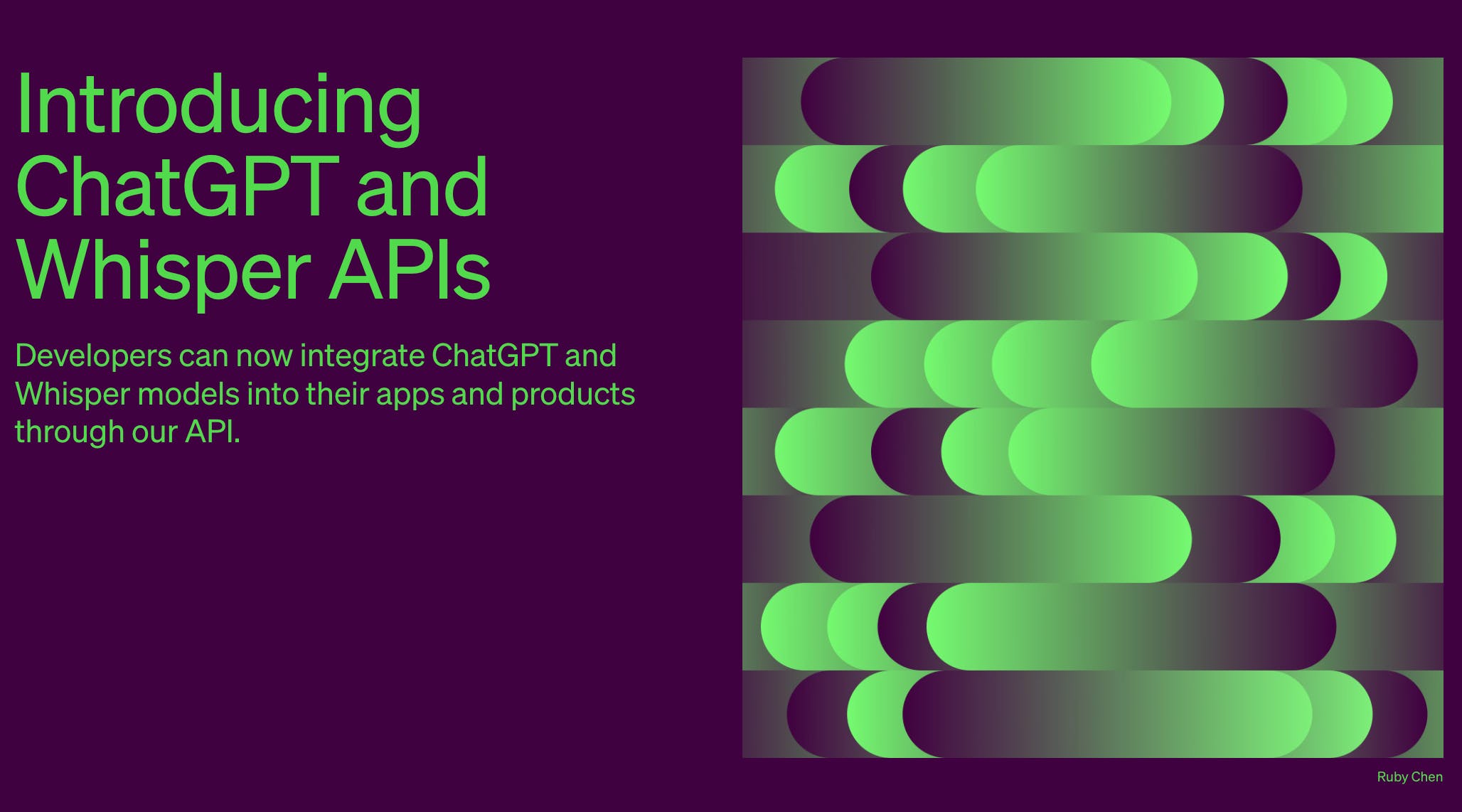Ready, set, ship: OpenAI’s API upgrades are geared towards makers
OpenAI — the artificial intelligence research company responsible for ChatGPT and DALL·E — has made major announcements concerning its API.
The highlights:
- ChatGPT model family gpt-3.5-turbo released: The same model used in the ChatGPT product, usage is now priced at $0.002 per 1k tokens, which is 10x cheaper than current GPT-3.5 models. The model is also better for non-chat use cases.
- Whisper large-v2 model released: Whisper is a speech-to-text model OpenAI open-sourced in September 2022. The large-v2 model is now available with The OpenAI API, and is apparently faster and more cost-effective to run. Whisper’s pricing is structured for on-demand access at $0.006 / minute.
- 90% reduction in costs on ChatGPT since December: OpenAI cites “a series of system-wide optimizations,” as the cause for achieving such a substantial cost reduction and says they’re “now passing through those savings to API users.”
What is The OpenAI API, exactly?
Taking a quick step back: the OpenAI API refers to a collection of tools that enable developers and makers to integrate OpenAI’s cutting-edge models into their projects.
(API = application programming interface = a set of definitions and protocols to build and integrate application software.)
These updates to their API follow another big monetization move OpenAI made in early February of this year, when it launched its $20/month premium subscription tier, ChatGPT Plus.
Models currently included in the OpenAI API
Whisper and GPT-3.5 are two of seven OpenAI models currently available through the API. All of the models have different capabilities and price points:
- GPT-3.5: A set of models that improve on GPT-3 and can understand as well as generate natural language or code
- DALL·E: A model that can generate and edit images given a natural language prompt
- Whisper: A model that can convert audio into text
- Embeddings: A set of models that can convert text into a numerical form
- CodexLimited (beta): A set of models that can understand and generate code, including translating natural language to code
- Moderation: A fine-tuned model that can detect whether text may be sensitive or unsafe
- GPT-3: A set of models that can understand and generate natural language
For more information on those, check out OpenAI's API product documentation.
ChatGPT and Whisper models available; upgraded ToS for devs
The TL;DR on the latest API announcement: OpenAI has officially made ChatGPT and Whisper models available within its API, which provides developers with access to the latest cutting-edge language and speech-to-text capabilities, at a reduced cost.
Through what the announcement refers to as “a series of system-wide optimizations,” OpenAI has achieved 90% reduction in costs since December, and says it is now passing on those savings to API users.
OpenAI also says they’ve been listening closely to feedback from developers, and have refined their API terms of service specifically to better meet their needs.
Early OpenAI API applications and case studies
Several companies have already started using OpenAI’s APIs in their products, including Snapchat, Quizlet, Instacart, and Shopify.

Snapchat’s My AI
My AI for Snapchat+ is running on ChatGPT API and offers a chatbot Snapchat’s 750 million monthly users can easily access through their app. My AI can recommend birthday gift ideas for your BFF, plan a hiking trip for a long weekend, suggest a recipe for dinner, or even write a haiku about cheese for your cheddar-obsessed pal.

Quizlet's Q-Chat
With the launch of ChatGPT API, Quizlet is introducing Q-Chat, a fully-adaptive AI tutor that engages students with adaptive questions based on relevant study materials delivered through a fun chat experience.

Instacart’s Ask Instacart
Launching later this year, Ask Instcart is a tool that uses ChatGPT alongside Instacart’s own AI and product data from their 75,000+ retail partner store locations to enable customers to ask about food and get shoppable answers.

Shopify’s Shop app
Another tool powered by ChatGPT API, Shopify's consumer app is used by shoppers to find local merchants, stay in the loop with liked brands, speed up checkout with Shop Pay, and track purchases in one place.

The Speak App
Speak, an AI-powered language learning app, is the fastest-growing English app in South Korea. It’s already using the Whisper API to power a new AI speaking companion product, with the aim of achieving human-level accuracy for language learners to unlock true open-ended conversational practice and more accurate feedback.
What’s next for OpenAI
Over the past six months, OpenAI says it’s been collecting feedback from its API customers to understand how it can better serve them. The company has made concrete changes, such as improving developer documentation, simplifying its Terms of Service and Usage Policies, and removing its pre-launch review. Additionally, data submitted through the API is no longer used for service improvements, unless the organization opts in.
According to the announcement, the engineering team's top priority is now stability of production use cases, as they know that “ensuring AI benefits all of humanity requires being a reliable service provider […] and believe that AI can provide incredible opportunities and economic empowerment to everyone, and the best way to achieve that is to allow everyone to build with it.”
Got plans to start building next-gen apps powered by ChatGPT, Whisper, or other models in OpenAI's API?
Let us know in the comments.
#BuildInPublic 👀

